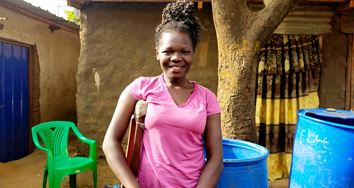Despite progress on paper, women with disabilities and female leaders in South Sudan continue to face discrimination, exclusion, and marginalization. From the halls of parliament to grassroots communities, their voices are often overlooked, their contributions undervalued, and their rights ignored.
While South Sudan has signed international frameworks like the United Nations Convention on the Rights of Persons with Disabilities (UNCRPD) and committed to promoting gender equality, the reality on the ground tells a different story.
Women with disabilities are not only battling the stigma of their physical challenges but are also marginalized within their communities and organizations. Meanwhile, female leaders who have made it to decision-making spaces find themselves sidelined, disregarded, and denied leadership opportunities despite their qualifications and long years of public service.
The lack of representation and persistent discrimination undermine the potential of women to influence policies, advocate for their rights, and shape the future of the nation. This ongoing marginalization is not just a violation of their fundamental rights but a critical barrier to South Sudan’s progress toward inclusive governance and sustainable development.
Discrimination against women with disabilities
Rose Aclini, Deputy Chairperson of the Union of Physical Disabilities in South Sudan, described the harsh realities faced by women with disabilities, both in society and within disability organizations.
“Men with disabilities often undermine us, treating us as useless,” she said. “We do not even have a permanent office where we can address our issues as women with disabilities.”
Aclini highlighted how cultural norms further compound their struggles, noting that women with disabilities are often seen as a burden rather than assets to their families.
“In some areas, particularly in Terakeka, women and girls with disabilities are tied down without food or proper care,” she revealed. “It’s heartbreaking to see how society devalues us just because we cannot bring dowries or fulfill traditional roles.”
Despite South Sudan’s commitments under the United Nations Convention on the Rights of Persons with Disabilities (UNCRPD), implementation remains weak. Aclini lamented that political parties still lack representation from women with disabilities, and many policies often remain unimplemented.
“South Sudan has policies on paper, but the reality is different,” she said. “Even women without disabilities face discrimination, so it is worse for those of us living with disabilities.”
Political exclusion and the struggle for representation
The exclusion of women is not limited to those with disabilities. Dousman Joice, a parliamentarian representing Lainya County in Central Equatoria State, has faced consistent sidelining despite her decade-long experience in parliament.
“I have been in parliament for 10 years, yet I am still being overlooked for leadership roles. People tell me I am a strong woman who can do a lot, but I am always pushed aside at the last minute,” she lamented. “It is frustrating to be treated like I am not qualified despite all my efforts. Some people feel threatened by strong women. They believe that if I take on a position, I will become popular and make an impact, so they block me from opportunities.”
Joice attributes this exclusion to deep-rooted cultural norms that undermine women’s capabilities.
She urged women to unite and speak out against discrimination, emphasizing that women’s voices should not be silenced in decision-making processes.
“As women, we need to be straight with each other and support one another in leadership,” she urged. “We need to wake up and voice our concerns loudly, especially in times of insecurity when it’s our sons, husbands, and brothers losing their lives.”
Meanwhile, capacity-building expert Batali Geoffery stressed the need for robust policies to protect women’s rights and ensure equal representation.
“Strengthening laws and policies, including the 2019 Sexual and Gender-Based Violence Act, is crucial,” he stated. “We must also increase women’s representation to at least 35 percent, as stipulated in the 2018 Revitalized Peace Agreement.”
Geoffery further emphasized the importance of empowering women economically through vocational training and entrepreneurship programs. He called for addressing sexual and gender-based violence and child marriage through comprehensive awareness campaigns and support services.
UN Women acknowledges challenges
Delphine Serumaga, UN Women Country Representative, acknowledged the challenges women face in realizing their rights, particularly in rural areas where cultural norms continue to dominate.
“Implementing gender policies remains inconsistent and is often hindered by traditional norms and lack of funding,” she said. “Women’s participation in politics and decision-making is hampered by economic dependence on men and a lack of awareness about their rights.”
Serumaga acknowledges the country’s notable progress in establishing legal frameworks to promote women’s rights. However, she points out that translating these policies into tangible change remains a significant challenge.
“South Sudan has put in place a comprehensive legal framework to advance women’s rights and gender equality, yet, implementing these policies continues to be an uphill battle due to deeply entrenched traditional norms and practices,” Serumaga explains.
She stresses the importance of shifting cultural attitudes and raising awareness to drive lasting change. Moreover, economic barriers often hinder women’s ability to access justice and fully participate in society.
“Women in rural areas, in particular, struggle to access legal services because of financial constraints and geographical isolation,” she adds.
A call for collective action
Aclini and Joice urged the government, civil society, and international organizations to take concrete steps to address these challenges and ensure that women’s voices are not just heard but acted upon.
“We need to push beyond workshops and seminars and take tangible actions that lead to real change,” Joice stressed.
“Support us with education and vocational training,” Aclini added. “Help us secure land and housing. We want to be part of building this country.”
The call to action is clear: without intentional inclusion and vigorous implementation of gender and disability rights policies, women in South Sudan—especially those with disabilities—will continue to face exclusion and hardship.




